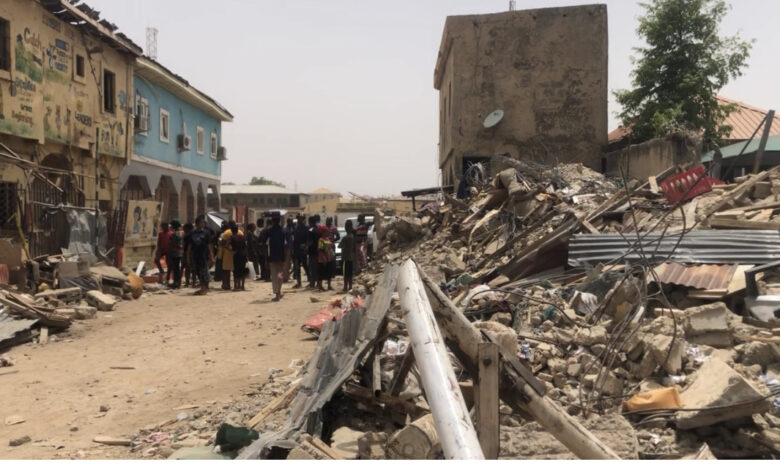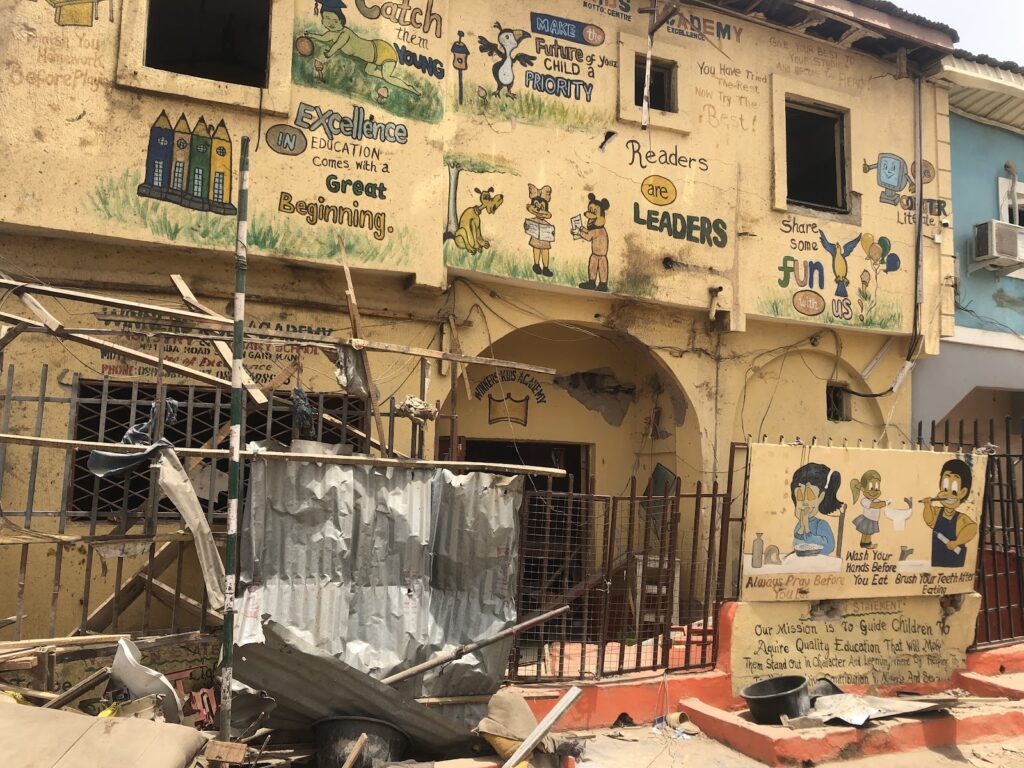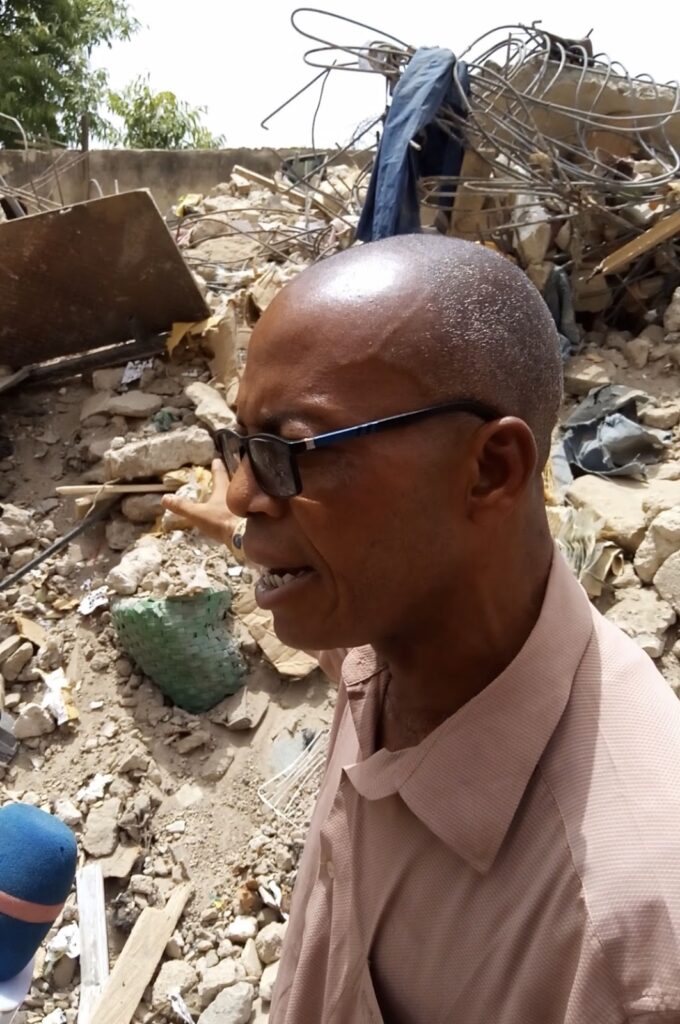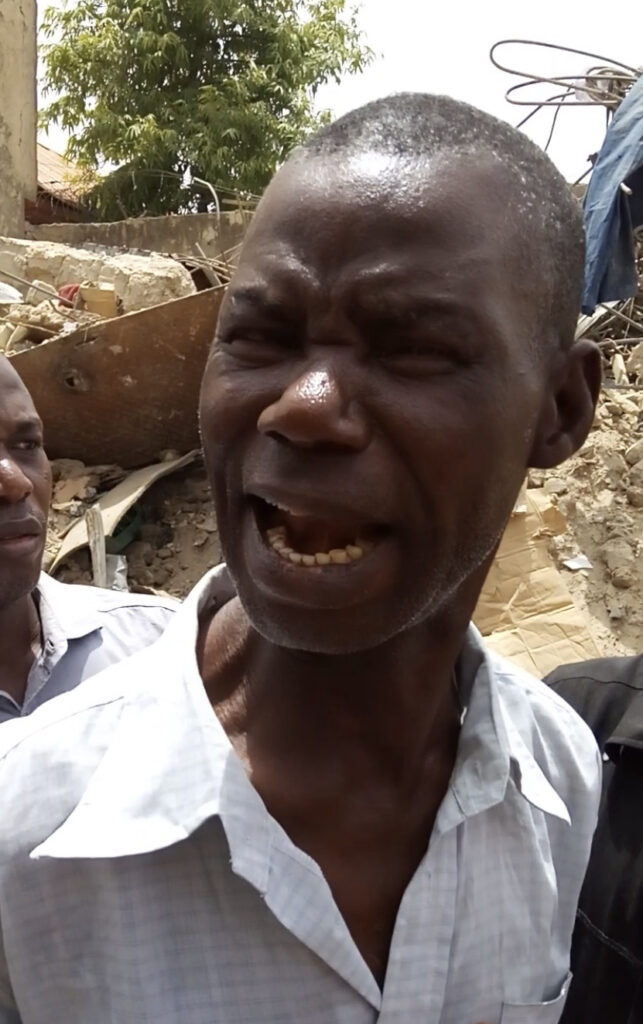Kano Explosion Was Suicide Bombing, Not Gas Explosion, Eyewitnesses Insist
Witnesses told HumAngle that the explosion, which rocked a school in the Sabon Gari area of Kano State, was the work of a suicide bomber who disguised as a mentally ill person.

The explosion that rocked Winners Schools, in Kano, Northwest Nigeria on Tuesday, May 17, was a suicide attack and not a gas explosion as claimed by the police, eyewitnesses told HumAngle.
The blast destroyed, not only the school’s pillars and rooftop but also an entire building across the street, killing nine people and injuring one.

Winners Schools is a nursery and primary school located on Aba road in the Sabon Gari area of the state.
The Nigeria Police Force confirmed the incident, saying that an early forensic investigation revealed that the blast was caused by an exploded gas cylinder from a welder who was working near the school. The police also stated that they recovered some explosive chemicals at the scene of the incident, while the injured victims are still being treated.
“Scene of the suspected explosion that led to a building collapse was cordoned off and four victims [3 males and 1 female], including a welder named Mr Ejike Vincent were removed and rushed to Murtala Mohammed Specialist Hospital Kano, where a Medical Doctor certified them dead. Preliminary Forensic Analysis revealed a suspected gas cylinder explosion with the recovery of Chemicals,” the police statement on Tuesday read.
However, residents and eyewitnesses claimed that the police narrative was incorrect. According to those who witnessed the explosion, a suicide bomber disguised as a madman was the one who exploded himself and caused such extensive damage to people and property.
An eyewitness who simply identified himself as Chinnonso, a mechanic whose workshop is just two buildings away from the school said “the man disguised as a mad man and tried to enter the school, but the gateman refused him access. A nearby welder chased the man, telling him to leave the area, so he relocated to a building where soft drinks are sold. He blew himself up there.”
According to Chinnonso, the police recovered chemicals used to repair car bumpers and are not highly explosive enough to destroy the buildings. “It’s just like paint,” he said.
Some Kano residents claimed to have heard the explosion from as far as seven kilometres away, an unusual sound for a gas explosion. It completely destroyed the building where the said bomber detonated himself and burned down a nearby car. Body parts were recorded in the footage circulating online.
Residents also told HumAngle that, contrary to what the police claimed, the welder was only there to prevent the man from entering the school, which led to his death. His shop was even the least affected and they claimed he wasn’t even using a gas cylinder because he was an electric arc welder.
“It’s about five kilometres from here to the nearest gas plant,” said Paul Ikenna, a local. “And the welder doesn’t even use gas in his work. As you can see, his location is the least affected. How did a gas that exploded here end up destroying there? If there was a gas plant nearby, we could suspect a gas explosion, but there isn’t,” he continued.

According to a man who said his son and two in-laws were killed in the explosion while his wife is currently being treated in the hospital, he was only there for a minute after dropping some water bags for his wife. He was about to drop his son off at Nigeria Television Authority (NTA) for an internship when he heard the explosion.
“The security and rescue personnel stationed there did nothing. Neighbours volunteered and helped rescue some of the victims. My wife and two other people were rescued later,” he said.
HumAngle previously reported that even after National Emergency Management Agency (NEMA) officials arrived, volunteers lamented a lack of proper tools to excavate victims of the explosion.
“My son, as well as my wife’s elder and younger brother, have all passed away. My wife is currently in the hospital and is semi-conscious. When she was asked to describe what happened, she said she thought her fridge exploded and she was there to remove the broken bottles when the building fell on her,” the man said.
“When I came in and saw five of my relatives in the building, I tried to enter but people stopped me. We later heard the police commissioner say it was a gas explosion. However, there is no gas plant nearby. It was a suicide attack,” he went on.

Residents in the area appealed to the government to assist the victims and prevent a similar incident from occurring in the future.
“We understand there is tension in the country, particularly in light of what happened in Sokoto, but there is nothing wrong with accepting the truth. The government may have used that to ensure no violence erupted, but accepting the truth will help make people more security conscious,” said a resident who refused to identify himself.
Support Our Journalism
There are millions of ordinary people affected by conflict in Africa whose stories are missing in the mainstream media. HumAngle is determined to tell those challenging and under-reported stories, hoping that the people impacted by these conflicts will find the safety and security they deserve.
To ensure that we continue to provide public service coverage, we have a small favour to ask you. We want you to be part of our journalistic endeavour by contributing a token to us.
Your donation will further promote a robust, free, and independent media.
Donate HereStay Closer To The Stories That Matter




